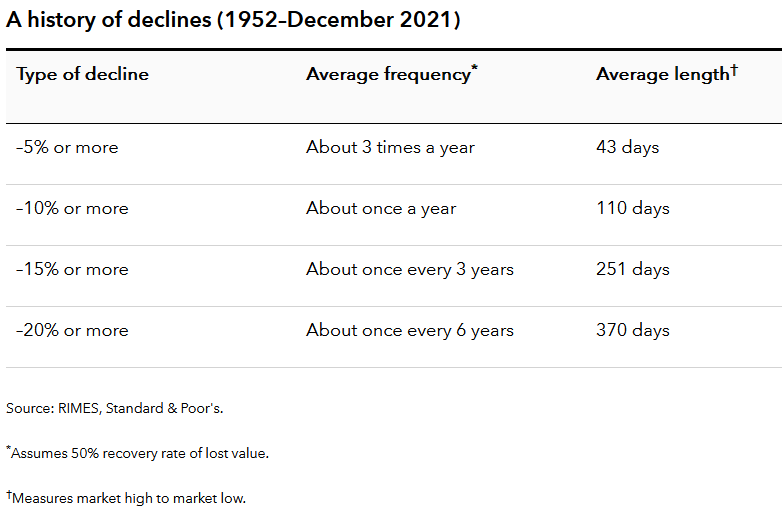On Monday June 13th, the S&P 500 Index entered into an “official” bear market. What does that mean? Well a long time ago, someone decided to define a bear market as being down 20% from the most recent high. So that’s where we are.
Many of you may be contending with fear and anxiety around the recent market action. It’s never easy to watch a large portion of your net worth evaporate in a few months.
Unfortunately, going through times like these is the price we all must pay to obtain successful investment results. After all, if the markets were without risk, then they wouldn’t offer much return.
What can we do to persevere and remain resilient during periods of market turmoil? Here are a few ideas:
Focus on the long term
Step one is to keep your eye on the horizon. When you drive a car down the highway, you don’t look 10 feet in front of the hood. You look far into the distance so that you can see potential road hazards and make a plan to avoid them.
Here is a nice table from Capital Group that illustrates the average length of market declines.

You’ll notice that market declines greater than 20% happen about once in every 6 years, and they last about a year. So if history is any guide, we have about 12 months of “fun” ahead. It could be more or less, but in any case, it’s unlikely the bear market will end tomorrow. So stay focused on your long-term goals and try to enjoy the ride.
Consider measuring your after-tax net worth
One trick that I’ve found helpful is to focus on your after-tax net worth instead of your pre-tax net worth. Many people have substantial assets in pre-tax 401(k) or IRA accounts. But many of those same people fail to realize that they do not “own” the full account. In fact, the US Government (and likely your state government) are co-investors to varying degrees. One good rule of thumb is to imagine that 25%1 of your pre-tax account value belongs to the government, so you don’t need to worry about the lost value in that portion.
For example, if you have a $100,000 of pre-tax money, then you would only include $75,000 in your measurement of net worth. Then if the market drops 20%, your total account value goes from $100,000 to $80,000 for a loss of $20,000. But your after-tax portion only drops from $75,000 to $60,000 for a loss of $15,000. I don’t know about you, but I feel a whole lot better thinking about only losing $15,000 instead of $20,000.
You can also apply this method to your taxable brokerage accounts. Likely you will use a different tax “haircut” rate given the preferential treatment of long-term capital gains, but the principle remains the same.
By focusing on after-tax net worth, you can get a more realistic and often less scary view of the actual dollar losses caused by the bear market. In effect, you get to share some of the pain with the IRS.
Worry about what you can control, forget the rest
It’s not easy, but keeping a strict focus on your zone of control is crucial. The market is a complex engine of economic activity and mass psychology, and almost no one has any meaningful ability to influence its behavior.
So if you can’t do anything about it, then why worry about it? One of the most impressive attributes of any successful investor is their ability to maintain composure in the face of significant market sell-offs. Heck, some investors actually get EXCITED about market sell-offs!
If you are having trouble in this area, it can often help to talk with someone. Whether that person is a financial advisor, therapist, friend, or family member, the simple act of sharing your concerns or feelings of fear can help lessen their effect.
One foot in front of the other
A journey of a thousand miles begins with a single step.
Chinese proverb
Investing is long journey measured in decades, not days. Put one foot in front of the other. Stay disciplined and determined. We’ll get through this.
1 The exact tax “haircut” you should use will depend on your personal circumstances and where you live.

